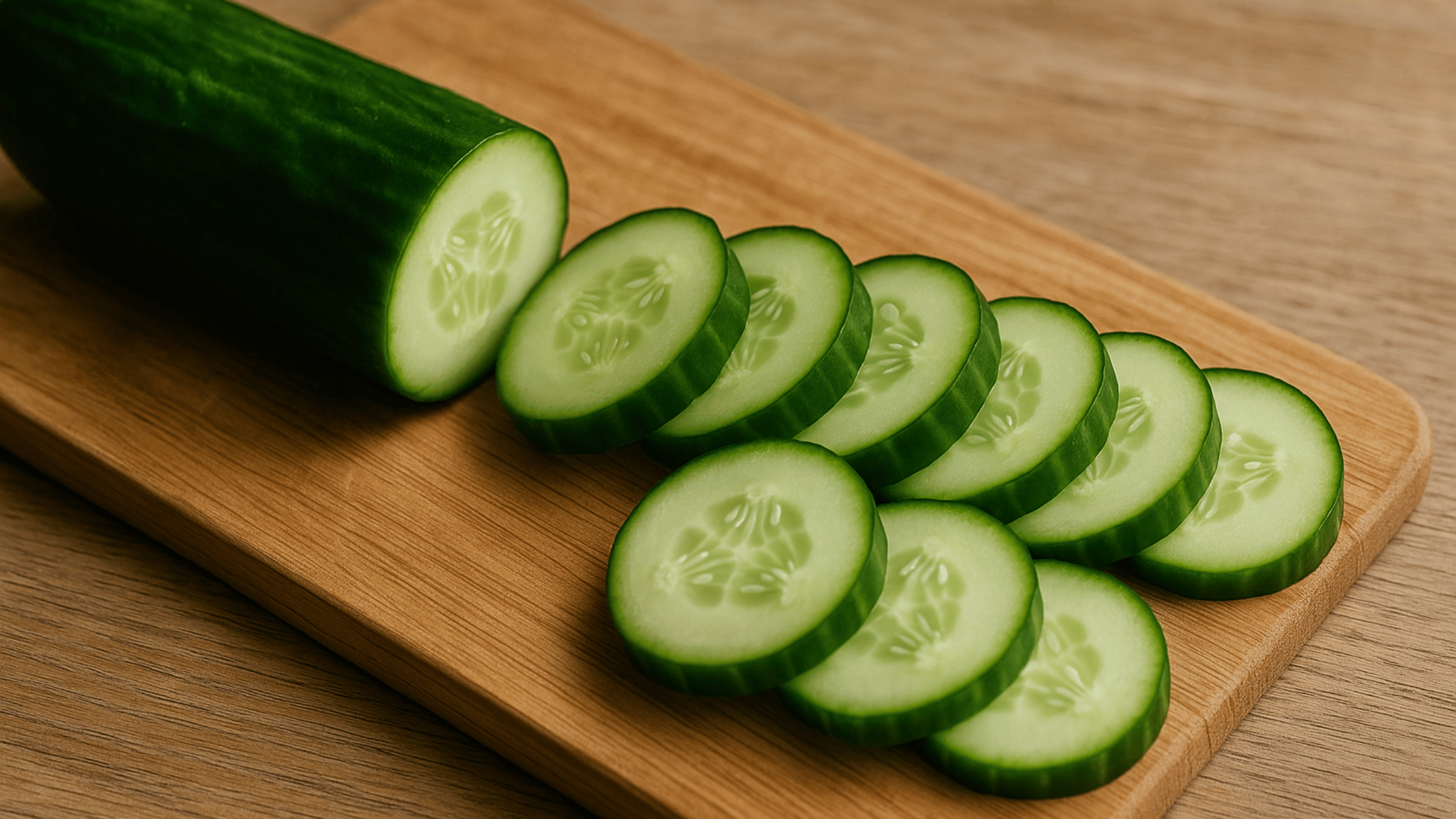Nutrition facts for cucumber are often overlooked because cucumbers are so common and subtle in flavor, but don’t let their simplicity fool you. This hydrating vegetable plays a powerful role in supporting digestion, skin health, weight loss, and even disease prevention. With its high water content, low calorie density, and supply of essential nutrients, cucumber is a staple food that supports wellness at virtually every level.
Often used in salads, infused waters, and healthy snacks, cucumber brings more to the table than just crunch. It delivers a range of antioxidants, trace minerals, and phytonutrients that contribute to detoxification, anti-inflammation, and improved hydration. From weight management to chronic disease prevention, cucumbers offer health benefits well beyond their calorie count.
In this comprehensive guide, we’ll break down the full nutrition facts for cucumber, explore its health benefits, provide preparation tips, and answer common questions—all designed to help you make smarter, health-driven choices.
Nutrition Facts for Cucumber (Per 100g, Raw, Unpeeled)
To understand the role cucumber plays in a healthy diet, let’s start with its raw nutritional profile. The following values apply to 100 grams of raw cucumber, with the skin on:
- Calories: 15
- Protein: 0.6g
- Fat: 0.1g
- Carbohydrates: 3.6g
- Fiber: 0.5g
- Sugar: 1.7g
- Water: 95–96%
- Sodium: 2mg
- Potassium: 147mg
- Vitamin C: 2.8mg
- Vitamin K: 16.4µg
- Magnesium: 13mg
Cucumbers are exceptionally low in calories and extremely hydrating due to their high water content. Despite being mostly water, they still provide valuable micronutrients—especially vitamin K, potassium, and antioxidants like beta-carotene and flavonoids.
The nutrition facts for cucumber make it ideal for high-volume eating. It can be consumed in generous portions without adding significant calories, making it a powerful tool for appetite control, hydration, and weight management.

Cucumber’s Macronutrients: Low in Calories, High in Hydration
Cucumber is classified as a non-starchy vegetable, which means it provides minimal calories and carbohydrates. A whole medium cucumber (about 200g) contains only around 30 calories, making it one of the lowest-calorie vegetables available.
Its carbohydrate content is low and consists primarily of natural sugars and fiber. The fiber in cucumber is mostly insoluble, which supports digestive health and promotes regular bowel movements. While the protein and fat content is negligible, cucumber’s high volume and hydration capacity give it unique value.
More importantly, cucumber’s low glycemic index ensures that it has a minimal impact on blood sugar, beneficial for people with diabetes, insulin resistance, or anyone following a low-glycemic diet.
Micronutrients in Cucumber: A Subtle but Important Source of Nutrition
Though cucumbers aren’t a concentrated source of vitamins or minerals like leafy greens or root vegetables, they do offer a valuable range of micronutrients, particularly when eaten with the skin.
Vitamin K is the standout nutrient in cucumbers. A 100g serving provides approximately 20% of the daily recommended intake. Vitamin K is essential for blood clotting, bone mineralization, and cellular signaling. It plays a particularly crucial role in maintaining bone health in older adults.
Potassium is another important mineral found in cucumbers. While not as abundant as in bananas or sweet potatoes, cucumber provides a modest amount of potassium, which helps regulate blood pressure, fluid balance, and nerve signals.
Vitamin C, a key antioxidant, is also present in small amounts. This vitamin supports immune function, collagen production, and helps combat oxidative stress from environmental toxins or poor dietary choices.
Cucumbers also contain trace amounts of magnesium, manganese, phosphorus, and copper—all of which play subtle roles in energy metabolism, bone maintenance, and enzyme activity.
RELATED ARTICLE: Nutrition Facts for Chicken Breast: The Ultimate Guide to Lean, Nutrient-Dense Protein
Antioxidants and Phytochemicals: Beyond the Basic Nutrition Label
One of the lesser-known aspects of the nutrition facts for cucumber is its contribution to antioxidant defense. Cucumbers contain a class of compounds known as cucurbitacins, which have been studied for their anti-inflammatory and anticancer potential.
In addition to cucurbitacins, cucumbers offer flavonoids like quercetin and apigenin, which have antioxidant and anti-allergy effects. These compounds may help reduce oxidative damage to cells and improve vascular function, although their concentration in cucumber is relatively modest compared to berries or green tea.
Eating cucumbers with the skin increases the intake of these beneficial compounds. Washing and slicing the cucumber without peeling allows you to enjoy the added nutrition without losing flavor or texture.
Hydration and Electrolyte Balance: Cucumber as a Natural Hydrator
Because cucumber is over 95% water, it is one of the most hydrating foods you can consume. This makes it a powerful dietary tool for preventing dehydration, especially during hot weather, physical activity, or illness.
While drinking water is essential, consuming water-rich foods like cucumber can improve overall hydration status by combining fluid with small amounts of natural salts and sugars, which enhance absorption. The potassium content supports electrolyte balance, making cucumber a gentle and natural way to replenish fluids lost through sweat.
Including cucumbers in smoothies, juices, or infused water not only improves flavor but can also reduce the reliance on sugary sports drinks or beverages that provide little nutritional value.
Health Benefits of Cucumber: More Than Just Low Calories
Supports Weight Loss and Satiety
The most obvious benefit of cucumber is its ability to fill you up without filling you out. Its low calorie density allows for large portions with minimal caloric impact, which is key in appetite regulation and portion control. Including cucumbers in salads, wraps, and snacks can help reduce overall food intake without triggering hunger.
Aids Digestion
The fiber content in cucumber, particularly from the skin, contributes to healthy digestion by promoting regular bowel movements and reducing constipation. Insoluble fiber adds bulk to stool and helps food pass more easily through the digestive tract.
Promotes Skin Health
Thanks to its high water content and presence of silica, cucumber may support skin hydration and elasticity. Topical application of cucumber slices has long been used to reduce puffiness and soothe irritation, but eating cucumber regularly also provides hydration from the inside out.
Helps Manage Blood Pressure
The potassium in cucumber helps counteract sodium’s effects in the body and relaxes blood vessel walls. This may aid in controlling blood pressure, particularly in individuals consuming a high-salt diet.
Supports Blood Sugar Management
Cucumber’s low glycemic index and minimal sugar content make it suitable for people with type 2 diabetes. Its fiber and water volume can help slow digestion, stabilize blood sugar, and prevent post-meal glucose spikes.
Allergies, Intolerances, and Health Precautions
Although cucumber is considered a very low-risk food in terms of allergies, some individuals may experience oral allergy syndrome (OAS) due to cross-reactivity with ragweed or birch pollen. Symptoms may include mild itching or tingling in the mouth after consuming raw cucumber. Cooking usually neutralizes the allergens involved.
Another consideration is the cucurbitacin content, which, in very large amounts, may cause digestive discomfort or bitterness. This is rare in commercial varieties, but wild or garden-grown cucumbers sometimes produce higher cucurbitacin levels, especially if left to over-ripen.
Individuals prone to digestive sensitivity, such as those with IBS (irritable bowel syndrome), may experience mild bloating or gas due to cucumber’s insoluble fiber or raw nature. In these cases, steaming or lightly cooking the cucumber may help.
Storage and Food Safety Tips
Fresh cucumbers should be stored in the refrigerator, ideally in a produce drawer, where they will remain crisp for up to one week. They are sensitive to moisture loss, so wrapping them in a paper towel or storing them in a perforated produce bag can help preserve freshness.
Avoid storing cucumbers near ethylene-producing fruits like bananas or tomatoes, which can accelerate spoilage. For sliced cucumber, use an airtight container and consume within 2–3 days for best texture and flavor.
Washing cucumbers thoroughly under cool water is essential, even if you’re peeling them, as bacteria or pesticide residue can linger on the skin. Use a vegetable brush for extra safety if you plan to eat the skin.
Preparation Tips for Maximizing Nutritional Value
How you prepare cucumber influences its nutritional contribution to your meal. Keeping the skin on preserves fiber and antioxidant content. For those concerned about bitterness, peeling may be necessary, but doing so slightly reduces nutrient intake.
Avoid pairing cucumbers with heavy, creamy dressings that undermine their light, hydrating profile. Instead, use lemon juice, vinegar, Greek yogurt, or olive oil-based dressings for added flavor without excess fat.
Cucumbers can be spiralized into noodles, blended into cold soups like gazpacho, pickled for gut health, or simply sliced raw for snacking. When juicing cucumbers, keep in mind that fiber is removed, though the fluid and minerals remain.
Frequently Asked Questions (FAQs)
Q: How many calories are in one whole cucumber?
A medium cucumber (about 200g) contains roughly 30–35 calories, making it ideal for low-calorie snacking or bulking up meals without adding weight.
Q: Is a cucumber good for weight loss?
Yes. Cucumbers are low in calories and high in water, which increases fullness without adding fat or carbs. They support calorie control and hydration.
Q: Should I eat cucumber with or without the skin?
Eating cucumber with the skin is best for maximum fiber, antioxidants, and vitamins. Wash thoroughly to remove pesticides or dirt.
Q: Is cucumber good for diabetics?
Absolutely. With a glycemic index near zero and high water content, cucumber is a great addition to a diabetes-friendly diet.
Q: Can you eat too much cucumber?
Cucumber is generally safe, but excessive consumption may cause mild bloating or stomach discomfort in sensitive individuals due to its insoluble fiber.
Q: Is cucumber a fruit or a vegetable?
Botanically, cucumber is a fruit because it contains seeds and develops from the flower of the plant. In culinary terms, it’s treated as a vegetable.
Conclusion: Why Cucumber Deserves a Daily Spot on Your Plate
The nutrition facts for cucumber reveal a food that is light on calories but full of hydration, antioxidants, and health-promoting nutrients. Its versatility in both raw and cooked dishes, low glycemic load, and natural ability to support weight management, digestion, and hydration make it more than just a salad filler—it’s a functional food in its own right.
Adding cucumber to your daily meals—whether as a snack, a side, or a refreshing juice—offers long-term benefits that extend far beyond the scale. Clean, cooling, and nutrient-supportive, cucumber is one of the most underrated power players in nutrition.







